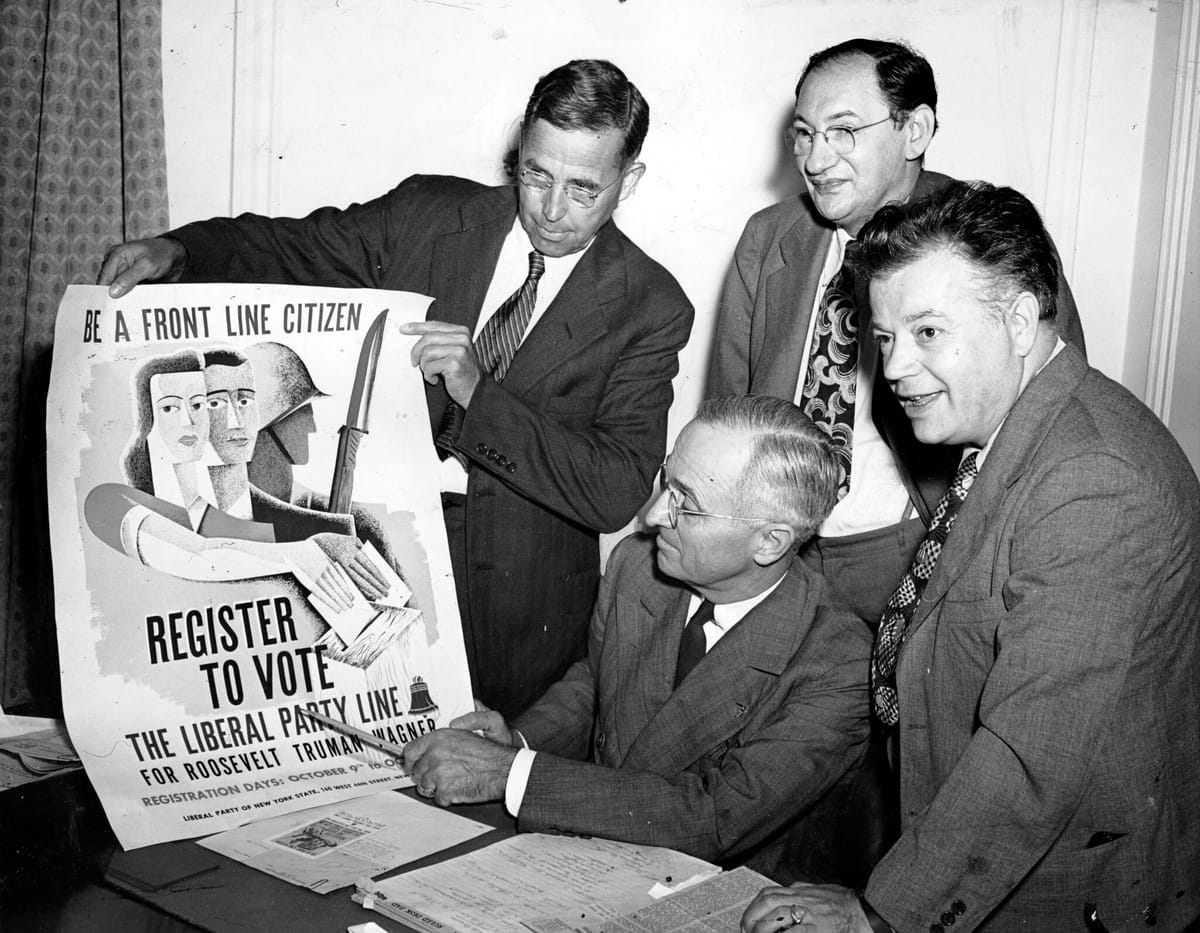Elections Are Purely Practical
Don’t be vain about your vote.

Democracy, historically, supplanted monarchy. Autocracy remains seemingly the only actual alternative to democracy. Either there’s a means of aggregating the views of some broad swath of the public into a decision on leadership, or whoever leads doesn’t have that mantle and that source of legitimacy, and whatever reason they claim for being the leader of the government, we may as well call it autocracy.
For some of our lifetimes, perhaps, it has been the case that most of the public and most major candidates for President were committed to democracy, and so American elections often have seemed not to be part of the long-running contest between democracy and autocracy. But this year's election definitely is.
Many of us, rather than regarding voting as one more bit of annoying work that has to be done to keep our governments on track, regard voting as a singular opportunity to express ourselves. But rather than thinking the grandiose thought on Election Day that it is finally our moment to weigh in, we should instead merely put on our to-do list for that Tuesday that we gotta do the voting, and the yard work, and pick up the kids.
Some have complained that the attitude toward voting I just described, that voting is a mere ‘civic duty,’ isn’t what motivates most voters to vote. But it doesn’t matter why other people are voting, because you can only control yourself. If everyone else votes randomly—if they vote on the basis of candidate suit color—if they’re aliens controlled by UFOs—if they were persuaded by a TV ad, by a meme, by a tawdry lie, or by the most incredible piece of intellectualism ever dropped—from your perspective it just doesn’t matter: It’s still the case that your vote does improve our chances of not having a king, and your vote is worth much more than the time it takes to cast it. Since you’re here you probably do want the incredible intellectualism, so let’s do the math on that last part.
The chance of a national election being swung by one vote is around 1 in 60 million, maybe more likely, maybe less likely. That’s a long shot.
Say I told you that democracy advocates could play a lottery where we had a 1 in 60 million chance of winning, but there’s nothing stopping us from playing it 80 million times—if we get our act together. We’d have a 74% chance of winning that lottery.[1] Coincidentally, 80 million popular votes these days might give a Presidential candidate about that chance of winning the Electoral College. A few million more votes than that would push the chance of victory close to 100%.
And say it costs us $10 billion-with-a-b every election cycle to get our act together. Some of this is the time we spend actually voting; some of this is campaigning and organizing; some of this is advertising, memeing, and writing highly persuasive short essays; some of it is swallowed pride (you didn’t get to vote for yourself, or for Cornel West). Sounds like a lot, as billion does end in -illion.
But what’s the difference to the country, and to the world, of four more years of a Democratic presidency as opposed to an unknown number of years subjected to Donald Trump? If it is barely one tenth of one percent of GDP per year, the difference in national income between the candidates will be $100 billion-with-a-b over four years.
Now that estimate of the difference is too low, I think. GDP is a measure of production or income, not a measurement of wealth or well-being. Under a know-nothing Trump administration it’s plausible that not only might our production be less over the four years but that serious long-term damage to our capacity for production would be done, through and alongside failures in moral education, in keeping up our health, and frankly all over the place. So I’d tack on sizable reductions in our wealth and well-being to that 0.1%-or-greater annual reduction in our income.
So for this election we would have spent $10 billion to have a good chance (maybe 40%, 50%, 74%?) at gaining—or not losing—at least $100 billion. That is a fantastic opportunity. It’d be irrational to pass it up.
What about just your own vote, though? The one vote by its lonesome that you cast. Say it costs you $20, or even $50, to vote. You’ll have given democracy one more 1 in 60 million-with-an-m shot at prevailing, which if it hits will garner $100 billion-with-a-b or far more for society. In expected value terms, you'll have made a donation to your country of over $1,500 at a cost to you of $50. This too is not irrational; this is nice. Thank you.
That’s enough of a reason for you to vote and to say to any supporters of democracy you know that you vote and that they should vote. Every two or four years we should do that annoying chore, bear that $10 billion cost together, win big money, and go on safer, saner, and freer from there.
[1] To avoid winning the lottery, we’d have to miss 80 million times in a row. The chance of missing once is 59,999,999 ÷ 60,000,000, and so the chance of missing 80 million times in a row is (59,999,999 ÷ 60,000,000)80,000,000 = 0.26, and so our chance of winning the lottery would be 1 − 0.26 = 0.74 = 74%.
Featured Image is Harry S. Truman, Dr. John L. Childs, Alex Rose, and David Dubinsky look over a campaign poster urging people to register to vote, 1944.




